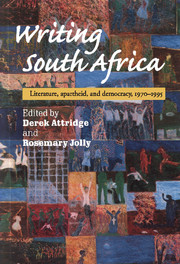Book contents
- Frontmatter
- Contents
- Contributors
- Acknowledgements and note on references
- South Africa, 1930–1996: a chronology
- Maps
- 1 Introduction
- 2 Interrogating silence: new possibilities faced by South African literature
- 3 I am dead: you cannot read: André Brink's On the Contrary
- 4 Endings and new beginning: South African fiction in transition
- 5 The post-apartheid sublime: rediscovering the extraordinary
- 6 Postmodernism and black writing in South Africa
- 7 Shame and identity: the case of the coloured in South Africa
- 8 A man's world: South African gay writing and the State of Emergency
- 9 The final safari: on nature, myth, and the literature of the Emergency
- 10 Interview
- 11 Speech and silence in the fictions of J.M.Coetzee
- 12 ‘Dialogue’ and ‘fulfilment’ in J.M. Coetzee's Age of Iron
- 13 Interview
- 14 Inside out: Jeremy Cronin's lyrical politics
- 15 Spinning out the present: narrative, gender, and the politics of South African theatre
- 16 South African theatre in the United States: the allure of the familiar and of the exotic
- Position papers
- Select bibliography: South African literary writing in English, 1970–1995
- Index
16 - South African theatre in the United States: the allure of the familiar and of the exotic
Published online by Cambridge University Press: 05 July 2011
- Frontmatter
- Contents
- Contributors
- Acknowledgements and note on references
- South Africa, 1930–1996: a chronology
- Maps
- 1 Introduction
- 2 Interrogating silence: new possibilities faced by South African literature
- 3 I am dead: you cannot read: André Brink's On the Contrary
- 4 Endings and new beginning: South African fiction in transition
- 5 The post-apartheid sublime: rediscovering the extraordinary
- 6 Postmodernism and black writing in South Africa
- 7 Shame and identity: the case of the coloured in South Africa
- 8 A man's world: South African gay writing and the State of Emergency
- 9 The final safari: on nature, myth, and the literature of the Emergency
- 10 Interview
- 11 Speech and silence in the fictions of J.M.Coetzee
- 12 ‘Dialogue’ and ‘fulfilment’ in J.M. Coetzee's Age of Iron
- 13 Interview
- 14 Inside out: Jeremy Cronin's lyrical politics
- 15 Spinning out the present: narrative, gender, and the politics of South African theatre
- 16 South African theatre in the United States: the allure of the familiar and of the exotic
- Position papers
- Select bibliography: South African literary writing in English, 1970–1995
- Index
Summary
It struck me that to the world at large Africa has always been a dark hinterland of the psyche, perforce unexplored, a sunken continent of the unknown or the subconscious on which to project delicious fantasies of magic and death…Every North needs a South – it may even fabricate an internal one, as we see happening in Europe now – if only to provide for the movement of disequilibrium.
breyten breytenbachIn an address made to the United States Congress in June of 1990, shortly after his release from prison, Nelson Mandela read into the Congressional record the names of those black American leaders whose struggle anticipated his own. ‘We could not’, Mandela stated, ‘have heard of and admired John Brown, Sojourner Truth, Frederick Douglass, W. E. B. DuBois, Marcus Garvey, Martin Luther King, Jr and others – we could not have heard of these and not be moved to act as they were moved to act’ (Nixon, Homelands, 187). On 2 May 1994, after F. W. de Klerk's concession speech, Mandela spoke at an ANC victory celebration and again invoked the words of an American civil-rights leader; looking over at Coretta Scott King, who was with him on the podium, he repeated the words of her late husband, words with both personal and historical resonance: ‘Free at last! Free at last!’ (Mandela, Long Walk, 540).
- Type
- Chapter
- Information
- Writing South AfricaLiterature, Apartheid, and Democracy, 1970–1995, pp. 221 - 236Publisher: Cambridge University PressPrint publication year: 1998
- 4
- Cited by



